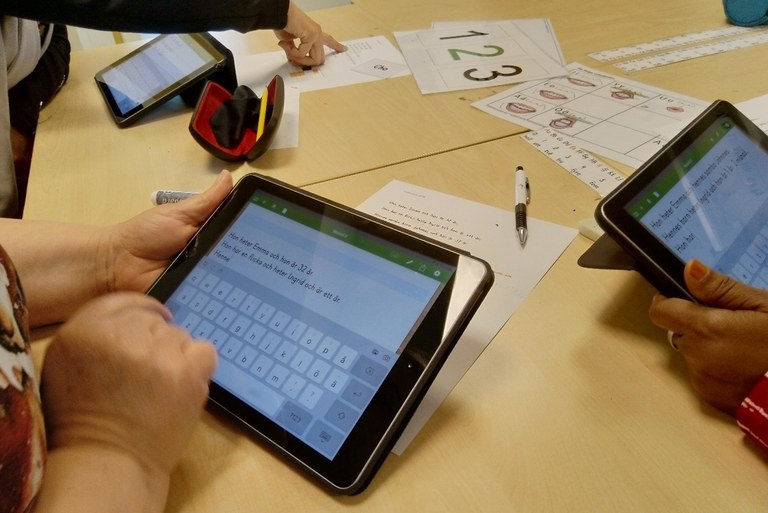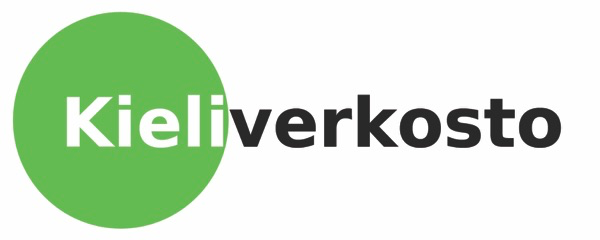Redesigning online learning material for an overlooked learner population
Julkaistu: 3. syyskuuta 2025 | Kirjoittanut: Eva Malessa
Who are LESLLA learners?
At the core of my doctoral research was a very special learner population. Adult migrants with limited, often also interrupted formal educational background. These learners are also referred to as LESLLA learners. About ten years ago I started to get involved in LESLLA research. Even though I am a language teacher, I had previously not been familiar with this specific learner population. So, let me tell you a bit about LESLLA learners. Due to ongoing global crises such as war, health and climate conflicts, more and more adults with limited, often also interrupted, formal education migrate to highly literate and digital countries such as Finland. Once they settle in their new home countries, they become so-called LESLLA learners. LESLLA stands for Literacy Education and Second Language Learning for Adults. This term refers to adult learners who at the same time learn second language skills and often for the first time in their lives, literacy skills in this new language.
LESLLA learners’ challenges in their new highly digital and literate home countries
Settling in highly literate countries can be a considerable challenge for adults who have only emerging literacy skills in any language. Compared to children learning to read and write in their first language, adult LESLLA learners have the disadvantage that they only start to gain phonological skills and have a limited vocabulary in the language they learn to read and write in. Given the fact that many LESLLA learners are humanitarian migrants that have had traumatic experiences, learners might struggle with trauma and memory problems and can have additional learning difficulties that affect their memory and learning abilities.
As I mentioned earlier, many LESLLA learners have only limited and interrupted formal educational experience, and therefore did not learn how to “do school”, how to learn in a school setting. Consequently, they don't have the academic or learning skills needed and expected for Western schooling. However, as new members of highly literate and digitalized societies they face high expectations regarding their literacy and digital skills. In fact, Finland has been ranked the most literate country worldwide (Miller & McKenna, 2016) and was listed in the top three most digital countries (Ali-Yrkkö et al., 2019). Technology has indeed become indispensable in many areas of our daily life. To digitally include LESLLA learners, it is crucial to provide learning opportunities to practice not only print literacy and second language skills, but also digital skills.
Given the challenges LESLLA learners and their teachers face, it is highly surprising that traditionally little LESLLA research has been conducted by second language, literacy, and educational researchers. Globally LESLLA research has only started to emerge in the last twenty years, mostly thanks to the efforts of the multidisciplinary LESLLA research community and its members (see https://www.leslla.org/).
Technology as a potential support tool for LESLLA
Late literacy learners often need extensive and individualised training, depending on their first language, their learning skills and learning pace. In a classroom setting, it is often impossible to provide specific, repetitive training, for example decoding practice of words for learners to distinguish and identify sounds and their corresponding written symbols. Technology-mediated practice can provide learners with additional training, at their own speed and space. While the computer or mobile device does not mind repeating the same word over and over again, human teachers do. Technology-mediated learning also provides learners with independent training of their digital skills. Indeed, the recent outbreak of the COVID-19 pandemic emphasized the need and necessity of digital skill training and suitable online learning materials, not only for learners, but also their teachers.
Recalibrating my doctoral research due to the COVID19-pandemic
Originally, I planned to test Lukukupla, a digital literacy support game app, designed for Finnish-speaking children with LESLLA learners and their teachers in a classroom intervention (see Malessa, 2023a). Field testing of this learning game in adult basic education institutions was planned for 2020. Firstly, I prepared the practicalities for the field testing. This included writing information letters, designing official research documents including consent forms and privacy notices, as well as the recruitment of interested teachers. I was prepared for the field-testing. But I wasn’t prepared for a health crisis that turned into a global pandemic. The COVID-19 pandemic brought along very practical challenges for my doctoral research, most importantly restricted access to LESLLA learners and classrooms.
Looking back now, the pandemic was actually both a curse and a blessing, as it first intruded and then improved my research. I realised that testing the existing version of the Lukukupla game app targeted at Finnish speaking children with an adult LESLLA population would neither provide enjoyable nor efficient learning experiences nor advance technology-mediated learning practices and materials in LESLLA education. When I started to accept that a classroom testing would not be possible, I thought about alternatives. One teacher response in an online survey I conducted started to echo in my mind: The students want to play something, specifically designed for them, for adults. So, I decided to transform my planned classroom intervention into a participatory design study with LESLLA teachers. First, I explored teachers’ views and experiences of the use of technology, its challenges and solutions, before the pandemic and during the pandemic (see Malessa, 2023b). To do so, I used pre-pandemic online survey responses from 2019 and remotely conducted interviews during the first year of the pandemic in 2020.
LESLLA teachers’ thoughts on the use(rs) of educational technology, pitfalls and possibilities
The main challenges as well as solutions related to devices and digital skills (Malessa, 2023b). Inadequate access to devices was reported to be a main issue, particularly during the pandemic. School devices were given to advanced but not beginning LESLLA learners, because of limited availability of devices. One reported solution was the use of students’ own devices. However, using students’ devices was problematic because of the variety of devices and their unreliable functionality. Especially during the pandemic, when many students lacked internet access, teachers could not ensure equal access to digital, remote learning. In addition to device-related challenges, I also identified challenges relating to digital skills. Students were reported to use their own smart phones mainly for communicative purposes and had insufficient user experience particularly with computers and laptops. For example, using an external mouse was reported to be very demanding and distracting for learners.
Digital training in class required extensive human resources, because of the very diverse classes, regular learner absences, and a lack of suitable devices. Teachers strongly criticized the insufficient provision of devices and IT classes. They also stressed the importance of continuous, regular digital skill training right from the beginning of the studies, not only in the final stages. It is important to highlight that digital skills are main learning objectives in the current curricula and recommendations. There are however no official obligations to provide IT courses, only a recommendation for adult basic education. This paradoxical situation shows a systemic issue that needs to be addressed in future educational policy in Finland.
Regarding digital learning materials and tools, being able to access them was reported to be a crucial factor. Main barriers for LESLLA learners to access digital learning material were log-in procedures with written passwords and usernames. WhatsApp on the other hand, was reported to be a main communication channel during the pandemic. Students and teachers communicated via audio message and photographs. However, remote instruction of students with only emerging Finnish skills without direct demonstration was perceived as extremely difficult and teachers emphasized the lack of adequate digital learning methods and materials targeted at LESLLA learners.
Even though teachers are the main facilitators of technology-mediated learning opportunities, potential friends or foes of digital materials so to speak, they are usually denied decision-making regarding the design and content of the digital devices and materials they are supposed to use. However, for me as a researcher, with no access and insight into daily LESLLA practices and problems, teachers with their real-life experience and expertise are essential and valuable design partners.
Exploring and envisioning available, adequate, and accessible learning and research collaboration with LESLLA learners
In my doctoral study, three in-service LESLLA teachers remotely tested the Lukukupla game app with their own devices and during their free time (Malessa, 2025). In game diaries and during online interviews teachers discussed their user experience, potential barriers for a LESLLA target group and redesign ideas and solutions to make the game app more suitable for adult second language users. Teachers emphasized the strong impact visual features have on the game experience and user engagement. Lukukupla’s visuals were perceived as visually pleasing and motivating, despite their childishness. Specific font and background colours, such as white font on a dark background, were however reported as visual barriers to adult learners. Teachers also criticised the excessive use of visuals and a mismatch between words and visual content. Relevant visuals relating to learning content such as kitchen and food visuals, were seen to be important.
Trauma sensitivity should be of utmost importance in a learning environment design for LESLLA learners. For this reason, shooting and underground digging exercises were recommended to be deleted. The language used in the game, which was designed for first language speakers of Finnish, was perceived as too difficult for LESLLA learners and thus seen as a significant barrier to learning. For a LESLLA-friendly Lukukupla, teachers recommended relevant, familiar vocabulary and appropriate topics for adults in game content.
Overall, these findings underline the importance of available, adequate, and accessible online learning materials and environments for LESLLA learners. In addition to my participatory design study with teachers, I also investigated how to improve ethical research participation and inclusion of marginalized adult migrant learners including LESLLA learners (see Malessa 2023c). The main aspects impacting LESLLA learners’ participation were found to be the language used in the process, researchers’ and participants’ different backgrounds, understandings, and expectations of cross-cultural research, and finally researchers’ inadequate development of ethical reflection and responsibility.
Context-specific discussions and guidelines could support researchers to develop their ethical decision-making. For example, verbal consent should be considered a standard alternative to written consent and instructions on how to reach and document verbal consent should be available. Ideally, the existence of such guidelines could encourage researchers to conduct more experimental studies in LESLLA settings. A key priority in LESLLA research should therefore be the development of ethical research practices, participation, and production for and with LESLLA stakeholders.

Picture 1. LESLLA students in SFI (Svenska för invandrade) teaching.
Eva Malessa (PhD, Applied Language Sciences) is currently working as a project researcher at the University of Turku (https://www.utu.fi/en/people/eva-malessa), exploring education for sustainable development (ESD) in language education (https://sites.utu.fi/sustainlang/). For the last decade she has been involved in LESLLA research, specializing in technology-mediated literacy training and teaching of adult emergent second language readers.
References
Ali-Yrkkö, J., Mattila, J., Pajarinen, M. & Seppälä, T. (2019). Digibarometri 2019: Digi tulee, mutta riittävätkö resurssit? Helsinki: Taloustieto Oy. http://www.digibarometri.fi
Malessa, E. (2023a). How COVID-19 intruded and improved my applied LESLLA research in progress: Reflections on research-design and research ethics of an empirical serious game study on L2 literacy support of adult migrants in Finland. LESLLA Symposium Proceedings, 17(1), 111–126. https://doi.org/10.5281/zenodo.8075621
Malessa, E. (2023b). Technology-enhanced or technology-exhausted learning in adult migrant literacy education in Finland: Exploring teachers’ experiences and views in pre-pandemic and pandemic times. International Journal of Technology in Education and Science, 7(2), 104–128. https://doi.org/10.46328/ijtes.437
Malessa, E. (2023c). Enhancing ethical research participation and inclusion of marginalized adult migrant learners: An early career researcher’s perspective. Forum Qualitative Sozialforschung Forum: Qualitative Social Research, 24(3). https://doi.org/10.17169/fqs-24.3.4100
Malessa, E. (2025). Redesigning game-based literacy training with teachers: Accessibility and usability of an online learning environment for adult second language learners. EDeR. Educational Design Research, 9(2). https://doi.org/10.15460/eder.9.2.2348
Miller, J. W., & McKenna, M. C. (2016). World literacy: How countries rank and why it matters. Routledge.
